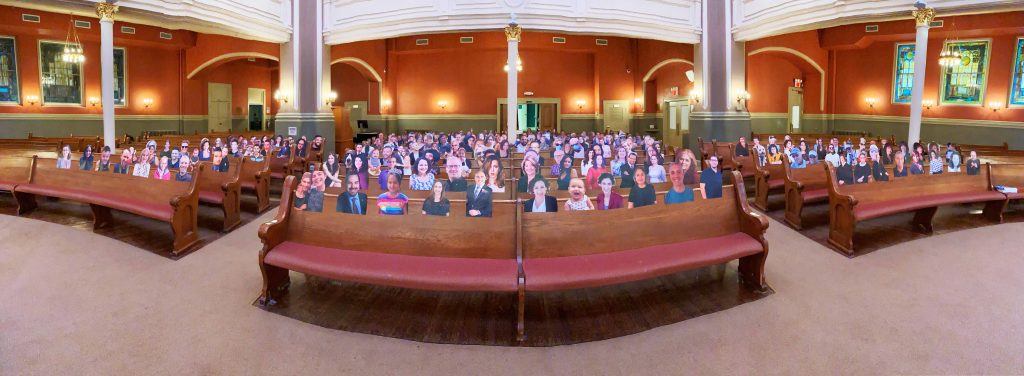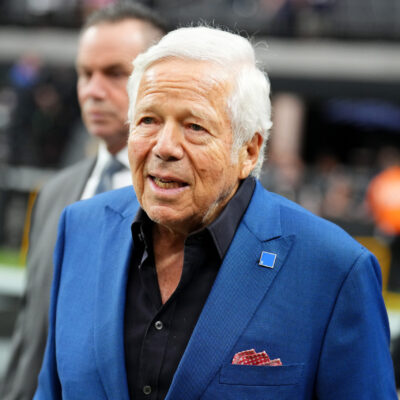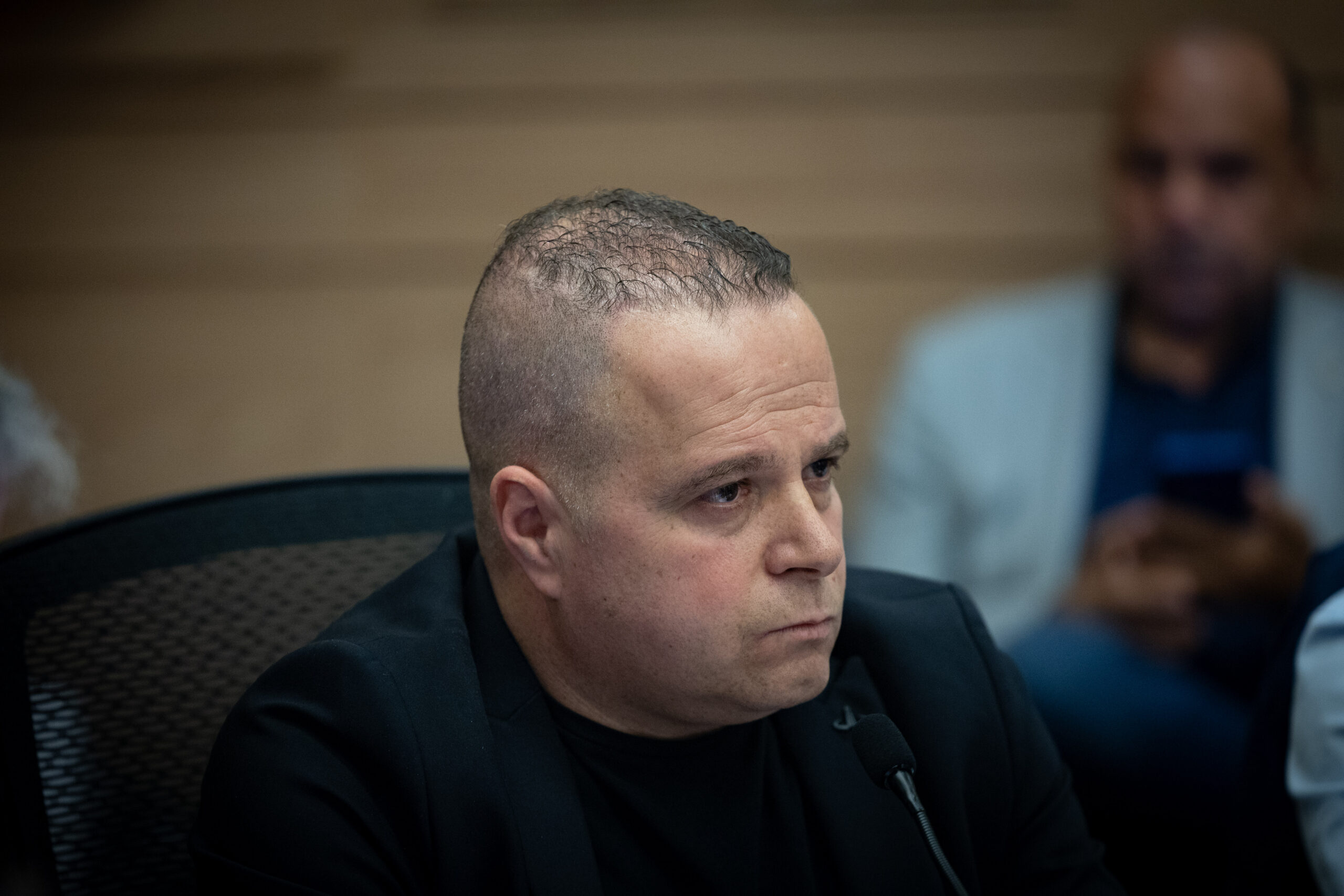Your Daily Phil: Moishe House taking over Hillel’s Base Movement + Nonprofit CEOs on saying ‘no’
Good Friday morning!
Moishe House, which provides living spaces and programming to young Jewish adults, is acquiring Hillel International’s rabbinical network Base Movement in an effort to offer more spiritual content and counseling.
“It is clear that investing in meaningful relationships between great rabbis and educators is a key to successfully unlocking the beauty of Jewish life,” Moishe House founder and CEO David Cygielman told eJewishPhilanthropy.
Created by Hillel in 2015, Base works by bringing young people into the home of a rabbinical couple for Jewish learning, Shabbat and holidays. Its rabbis had served students; now they will focus on young adults. The two organizations’ shared focus on the home makes them a natural fit, Cygielman said.
Moishe House, which has more than 130 communities in more than 25 countries, will gain oversight of six Base locations — in Manhattan, Brooklyn, Harlem, Chicago, Miami and Boston. Base rabbis are ordained in a range of seminaries, including the Jewish Theological Seminary and Yeshivat Chovevei Torah, as well as directly by individual rabbis.
Moishe House is working with the One8 Foundation on a three-year plan that will review and refine current operating and financial models and identify expansion locations. Moishe House will initially aim to bring Base locations to cities where Moishe House already has three or more residential locations.
MacKenzie Scott, Jeff Bezos’ ex-wife, was the source of 20% of all philanthropy related to COVID-19, according to a new report from the Center for Disaster Philanthropy and Candid, a provider of data and analysis about the nonprofit sector. The pandemic attracted $20.2 billion in giving. Giving related to the coronavirus was more than twice the amount given in response to the previous top 10 disasters combined, according to the Chronicle of Philanthropy.
Scott gave $4 billion; other wealthy donors gave a total of $1.8 billion. Private foundations gave $4.7 billion, while community foundations gave $500 million. Corporations gave $9.4 billion, although about a quarter of that was products like food instead of cash.
At the beginning of the pandemic, the Council on Foundations issued a public call — signed by almost 800 foundations — that funders make grants “as unrestricted as possible” to facilitate a nimble response by nonprofits, yet few awards in the data were specifically designated as “general support” wrote Patricia McIlreavy, CEO of the Center for Disaster Philanthropy, in the report.
Life lessons
The pandemic is teaching CEOs how to say ‘no’

Courtesy Sixth and I
Howard Libit was diagnosed with COVID-19 right before Thanksgiving, spending a night in the hospital with breathing problems before being discharged. Once home, he quickly took up his duties again as executive director of the Baltimore Jewish Council, a community relations, advocacy and interfaith group. His colleagues tried to let him rest. He put naps on his calendar, and was “pretty good” about taking them — for a while. Now fully recovered, Libit has learned something from the pandemic, he and several colleagues told eJewishPhilanthropy’s Helen Chernikoff in conversations about its challenges and opportunities. “The mental wear and tear is real,” he said. “I’m trying to say ‘no’ to stuff. I have to.”
Anniversary: It’s still not easy to do, though, for Libit and his colleagues at other Jewish organizations, said Gali Cooks, CEO of Leading Edge, a nonprofit that provides consulting to upper-level managers and human resources professionals at more than 350 Jewish groups. And as the pandemic hits the one-year mark, the question of whether and when managers should say “no” has become even more fraught. They are exhausted, and know their coworkers are as well. Yet as vaccines become more widely available, organization heads feel increasingly compelled both to sustain their pace, and to seize the day. “Leaders are caught in this tension between ‘survive and thrive,’” she said. “We know this is an unbelievable moment, but summoning up the energy to think about the next chapter is challenging.”
Stages: The pandemic’s anniversary is causing a “second wave of depression” — in the nonprofit, private and public sectors, said Marty Linsky, a professor at Harvard University’s Kennedy School who wrote The Practice of Adaptive Leadership and is on Leading Edge’s board. Coronavirus triggered confusion, disorientation and disruption when it started, followed by adaptation and a “can-do” period. Now, there is widespread exhaustion, he said.
Work in progress: Heather Moran, the CEO and executive director of the Sixth & I Historic Synagogue, a community center and synagogue in Washington, D.C., has learned over the course of the pandemic to even say no to funding, she said. “As nonprofits, we’re all used to operating from a place of hunger,” she said. “One of the things I have been trying to do is say that just because an opportunity is there, doesn’t mean we need to apply. There have been things that would have taken a lot of brainpower that would have been incredible opportunities, that we have not pursued, and I am at peace with that.”
Future proof
The ‘New Normal’: how to successfully adapt to a hybrid office model

Shutterstock
“As Americans begin to transition into a post-pandemic environment, leaders of national nonprofit organizations are being forced to reckon with how to make use of the lessons learned from our once strong business models when its underpinnings have been ripped away,” writes Shari Dollinger in an opinion piece for eJewishPhilanthropy.
Legacy work: For many reasons, in-person work at a central location hasn’t made sense in a long time. It’s expensive. It’s inefficient. And it limits the pool of available talent. There is a more strategic and sustainable way forward, but the inertia of establishing an office culture prevented all but the most daring to eschew tradition.
Accountability: For more than ten years, we’ve known that remote work allows for increased productivity and collaboration — wherever our staff chooses to be. Through collaborative workflows and goal setting, we’re able to hold all employees accountable. That’s the lynchpin in embracing remote work – accountability – and it requires full buy-in from top to bottom.
Worthy Reads
Screen Time: The director of Stanford University’s Virtual Human Interaction Lab, Jeremy N. Bailenson, wants to improve Zoom, which is why he has written an article about “nonverbal overload” in the journal Technology, Mind, and Behavior. Nonverbal overload, the reason so many people find Zoom tiring, consists of four possible components: “Excessive amounts of close-up eye gaze, cognitive load, increased self-evaluation from staring at video of oneself, and constraints on physical mobility.” [TechnologyMindBehavior]
Big Picture: Grant proposals do not have to be boring, Iain Bernhoft contends in Philanthropy Daily. What lies at the heart of foundation decisions is a human thinking about what is right, and every grant proposal should emphasize why the work matters, not worthy-but-boring subjects like budgeting. Tell the program officer a compelling story: “All that other detailed stuff—budget, outcomes, outputs, leadership, etc.—is just fodder for the post-facto rationalization.” [PhilanthropyDaily]
Adaptive Reuse: When the pandemic hit the United Kingdom, the charitable network London Funders repurposed an online funder portal it had created in response to the 2017 Grenfell Tower Fire, which killed 72 people and displaced more than 200 families. That new effort has gathered $93 million (?67 million), and distributed it to charities across London, Geraldine Tovey of London Funders reports in a blog post at the Center for Effective Philanthropy. Funders use the portal to view the same pool of applications and can indicate interest while they study the organization and make their decisions. [CenterEffectivePhilanthropy]
Digital Pushke: The percentage of households giving to charity declined to 53% in 2016 from 66% in 2020, according to a report from the Institute for Policy Studies project on inequality, and Bill and Melinda Gates have made it a priority to try to reverse that trend, writes Holly Hall in InsidePhilanthropy. The couple are focused on how to make charity easy for everyday donors, in the way that people in India use phones to make direct cash transfers. Bill Gates is working with IDEO, the design and consulting firm, on a “Reimagine Charitable Giving” challenge. [InsidePhilanthropy]
Community Comms
Apply! Want to join the team at Jewish Insider/eJewish Philanthropy? We’re looking for a top-notch philanthropy editor. Learn more here.
Be featured: Email us to inform the eJP readership of your upcoming event, job opening, or other communication.
Word on the Street
Slingshot has announced its 2021 “10 to Watch” list … The Jewish Community Response and Impact Fund (JCRIF) has updated the recently released RFP for Reset grants’ with new eligibility information and a new April 9th deadline for submitting a proposal … Mallory Kovit has been named director of campus programs at Volunteers for Israel … In the UK, a man who refuses a get will now be recognized as exerting controlling and coercive behavior, which is listed as a criminal offense … Illinois Gov. JB Pritzker, Israel Foreign Minister Gabi Ashkenazi and Prof.Yitshak Kreiss, director general of Sheba Medical Center, discussed the vision between Illinois and Israel to collaborate on a health innovation hub to be established on Chicago’s South Side …
Pic of the Day

Courtesy Golda Och Academy
The Jane and Daniel Och Family Foundation is making a $10 million challenge gift to Golda Och Academy, West Orange, N.J., to establish the Dr. Michael Och Fund for Faculty Excellence.
Birthdays

Courtesy AIPAC
President of AIPAC and the founder of BVision Sportsmedia, Betsy Berns Korn …
Friday: Israeli-American psychologist and author, winner of the 2002 Nobel Prize in Economics, Daniel Kahneman… Former University Counsel for California State University, Donald A. Newman… Pulitzer prize-winning journalist and author, Roy Gutman… Partner emeritus of Los Angeles law firm, Gordon, Edelstein, Krepack, Grant, Felton & Goldstein, LLP, Mark Edelstein… President of Los Angeles PR firm Robin Gerber & Associates, Robin Gerber Carnesale… Managing partner at Lerer Hippeau, Kenneth B. Lerer… Founder and CEO of the DC-based News Literacy Project, Alan C. Miller… Artist, writer, and professor of computer science at Yale University, David Hillel Gelernter… Actor, screenwriter and film producer, Jonathan Penner… President and founder of West End Strategy Team, Matt Dorf… Los Angeles area builder and developer, and a trustee of Temple Beth Am, Michael Reinis… President of the Colorado Solar and Storage Association, Michael N. Kruger… Senior Vice President at Hill+Knowlton Strategies, Daniel S. Schwarz… Business operations associate at TEKsystems, Andrew Leiferman… Popular singer whose career started with a song she performed at her own bat mitzvah, Madison Elle…
Saturday: Centenarian known as “Philadelphia Phil,” Philip Basser… Former chairman of the Federal Reserve of the United States, Alan Greenspan… Writer and emeritus professor of Jewish communal service at HUC-JIR Los Angeles, Steven Windmueller... Director of “When Harry Met Sally” and “A Few Good Men,” Rob Reiner… Television personality, John Stossel… Musical theatre lyricist and composer, Stephen Schwartz… Actor, comedian and sports show host, Tom Arnold… Executive producer at Momentum, Judy Victor… Founder of Talenti Gelato & Sorbetto and co-founder of Iris Brands, Joshua Hochschuler… Head of Innovation Communication at Bloomberg LP, Chaim Haas… Senior director for business development and client services at the Jewish Communal Fund, Michelle Lebowits… Former football quarterback who played on six NFL teams, Sage Rosenfels… Managing director at Berkshire Partners, Blake L. Gottesman… Fourth generation Mid-Atlantic real estate developer, Daniel Klein… National director of marketing and communications at the ZOA, Natalie Lazaroff… Israeli fashion model, Esti Ginzburg… Artist Tova Suissa… Graduate of Northwestern University’s Pritzker School of Law, Riley Clafton… JD Candidate at Stanford Law School, Theodore Furchtgott… Sandra Brown… Nelson Katz…
Sunday: Author and columnist, Suzanne Bregman Fields, Ph.D… President emeritus of the California Institute of Technology, a 1975 Nobel Prize laureate in Medicine, David Baltimore… Journalism educator at George Washington University, Myron Belkind… Former chairman and CEO of The Walt Disney Company, Michael Eisner… Geneticist and 2017 Nobel Prize laureate in Medicine, Michael Rosbash… Retired media executive, Ruth Barbara Jarmul… Chairman and general trust counsel of Fiduciary Trust International, Gail Ehrlich Cohen… Journalist and adjunct professor at the Philip Merrill College of Journalism at University of Maryland, Anne Farris Rosen… British public law and human rights barrister and a member of the House of Lords, the long-time chair of the British Legal Friends of Hebrew University, Baron David Philip Pannick… Executive director of Academic Exchange, Rabbi Nachum Braverman… Democratic political strategist, Lewis H. Cohen… Senior import policy analyst at the International Trade Administration, David W. Cordell… Professor of philosophy at Johns Hopkins University and the author and editor of several books about Baruch Spinoza, Yitzhak Yohanan Melamed… Academy Award winning actress, Rachel Weisz… Assistant news director for DC’s NBC4 News, Matt Glassman… Brooklyn-based political consultant and attorney, Michael Tobman… The spokesperson of the Embassy of Israel in Washington since 2018, Elad Strohmayer… News anchor and the host of Hatched on The CW Network, Nicole Lapin… Author and podcaster, best known for writing Breaking the Chains of Gravity, Amy Shira Teitel… President of HAUS Strategic Communications, Alan Neuhauser… Attorney in Reno, Nevada, Sasha Ahuva Farahi… Freelance writer at Just Women’s Sports, Rachel Zuckerman…


 Add EJP on Google
Add EJP on Google






